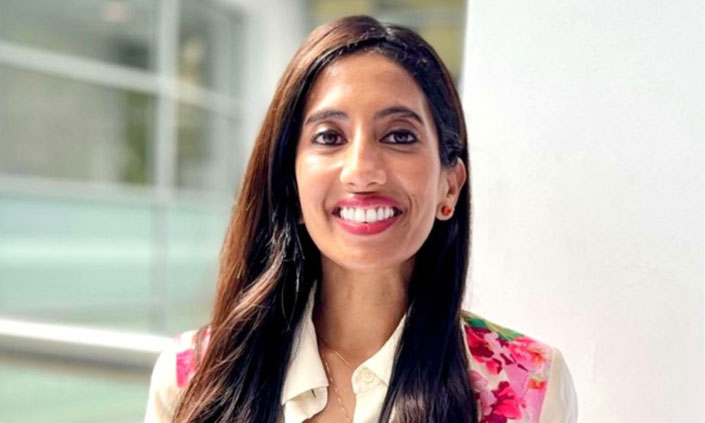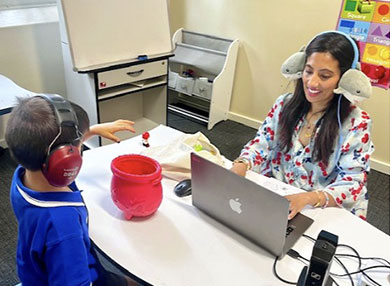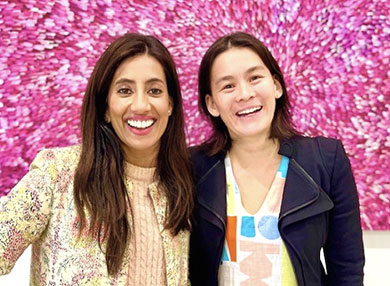The importance of hearing in learning
Melisha Sirisena studied Master of Clinical Audiology at Macquarie University – now she’s pioneering the screening of children’s hearing in schools.

“How can a child learn well if they can't hear well?” asks three-time Macquarie University alumna Melisha Sirisena, a paediatric audiologist raising awareness in schools, and among parents and professionals, of the importance of children's hearing.
“There’s still a long way to go. People think the newborn hearing check is for life, but it’s not. Hearing loss can develop at any age from infections, genetic causes, medical conditions or injury,” she says, giving the example of her seven-year-old nephew, a cochlear implant recipient who lost his hearing after contracting COVID.
That’s why screening at birth is an important first step, but shouldn’t be the only hearing check a child receives in their life. “Unlike vision, which is routinely checked in preschool, and then annually, hearing isn’t, so problems can go quietly unnoticed,” cautions Ms Sirisena.
While roughly one in 1,000 children has hearing loss at birth, by the time they reach school, this number has doubled, and by high school, it has tripled. “Educating teachers on hearing loss is critical – they see children daily, so are uniquely placed to identify concerns early and encourage timely referrals.”
And that’s where Kids Hearing steps in, supporting teachers and making hearing checks for children both routine and accessible. Founded in 2024 by Ms Sirisena to provide on-site school screenings and in-clinic follow-ups, parents opt in to the program, and already this year, more than 700 children have been tested.
“We estimate that one child in every classroom will have some form of temporary or permanent hearing loss, and our screenings in schools support this. It’s been eye-opening,” she continues. “Around 10 per cent of children have required further assessment, and of those, another 10 per cent have been diagnosed with significant permanent hearing loss requiring hearing aids.”
Often, the discoveries are unexpected, like a recent Year 3 student who'd been flagged for ADHD. “He'd passed his newborn screen, yet had significant hearing loss,” says Ms Sirisena. “It was having a major impact on his behaviour, but the school didn’t suspect his hearing was a concern.”

Sadly, it’s not uncommon. “Children rarely self-report like an adult might,” explains Ms Sirisena, so teachers and parents need to watch out for language, learning, behaviour or attention issues in children. “These can all be possible signs of hearing loss,” she says.
As well as the school screenings, Kids Hearing provides a comprehensive pathway for families, and supports teachers through professional development. “Once schools understand the link between hearing and learning, it naturally becomes part of their student wellbeing practices.”
But Ms Sirisena has an even bigger goal. “We want to gather enough data to demonstrate the scale of the issue to the Department of Education and advocate for systematic, government-funded hearing programs in schools to ensure all children have optimal hearing for learning.”
With such passion, it’s no surprise healthcare is her calling. “It aligns with my values and the impact I want to make in the world,” she says, explaining her pathway into healthcare was shaped by Macquarie University.
Originally interested in speech pathology, she enrolled in the Bachelor of Speech and Hearing Science, where she became intrigued by the medical and diagnostic aspects of audiology. The Master of Clinical Audiology, the only one of its kind in NSW at the time, was a natural progression, with Macquarie a pioneer in the field.
It was during her master’s that she found herself drawn to paediatric cases. “We had a range of clinical placements and diagnosing children and supporting families confirmed for me that this is where I feel most purposeful.”
Ms Sirisena describes her Macquarie experience as formative both academically and personally. “My now-husband Menaka and I crossed paths while studying in the early 2000s,” she shares. “We'd spend entire days in the library, poring over textbooks and journal articles."
“Everything was handwritten, and assignments were submitted by 5pm in a box outside the department. Students I supervise laugh when I describe those days, but I cherish them – the pace was different, and there was something special about how we learned and connected.”
In 2016, Melisha pursued a Master of Management at Macquarie to strengthen her business skills. “I've always been passionate about clinical care, but delivering exceptional services requires strong leadership, strategic thinking and an understanding of healthcare as a business."
“The Master of Management gave me the confidence to think beyond clinic appointments, to advocate for better systems, and to run my practice with both clinical excellence and sustainability in mind.”
During this time, the seed that would grow into Kids Hearing began to germinate. After years of living and working in Singapore with her family, she had seen firsthand the value of integrating audiology into education. “Children were assessed in school, identified early, and received timely support,” she notes.
Inspired, she began considering establishing a similar model in Sydney, where hearing services are limited for school children, and developed the framework for Kids Hearing while completing further university studies. With mentorship from her Audiology Head of Department at The Children’s Hospital, Fiona Duncan, the idea grew into a credible program.
“Kids Hearing began humbly with a pilot at my daughters' school after my youngest was flagged for phonic difficulties. When I asked whether her hearing and vision had been checked, it hadn’t – this was the moment I realised the gap and offered to help.”
During the pilot program, Ms Sirisena identified two children with significant hearing loss. “It validated the need and put hearing firmly on the map for the school. From there, Kids Hearing has grown, and is now expanding with the support of fellow Macquarie alumna and colleague at The Children’s Hospital, paediatric audiologist Lee Ann O'Connor."
“We both believe deeply in the cause, and as mothers ourselves, understand from experience the importance of hearing in learning. Lee Ann brings warmth, energy and over a decade of paediatric expertise. Together, we close the loop – identifying children in schools, confirming diagnoses in clinic, and ensuring children receive the support they need. It’s a full-circle achievement.”
Guided by their motto – Support Learning, Start with Hearing – they are reimagining the model of paediatric audiology. “Early identification really can change the entire trajectory of a child’s life – the children and families we've been able to help are the reason we do this work,” says Ms Sirisena.

Melisha Sirisena's bio
Melisha Sirisena holds a Bachelor of Speech and Hearing Science (2007) and a Master of Clinical Audiology from Macquarie University (2009), as well as a Master of Management (2016 ) (MBA) from Macquarie Business School.
With over 15 years of experience in diagnostic hearing assessment and individualised hearing management, Melisha is a highly skilled paediatric audiologist who has worked in both Australia and Singapore. She has represented the field of audiology on both local and international stages through award-winning conference presentations, published research, book contributions and media features.
Trained at The Children’s Hospital at Westmead, she has developed a reputation for clinical precision, particularly in complex cases, and is widely trusted by Sydney schools, families and healthcare professionals seeking clarity around a child’s hearing status. As the founder of Kids Hearing, which connects audiology with schools, she is making hearing health more accessible for children.